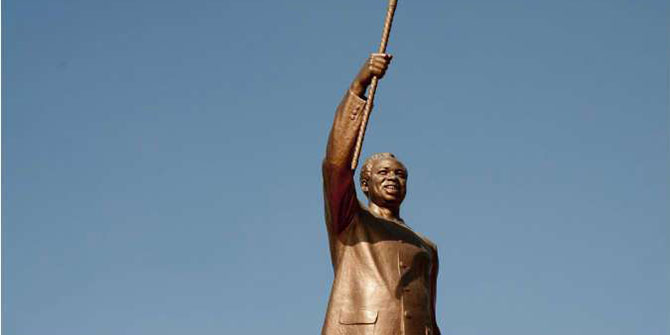LSE’s Harry Pettit reviews Matthias Krings’ latest book, African Appropriations: Cultural Difference, Mimesis and Media which engage those interested in understanding and theorising popular culture in Africa.
Matthias Krings has written extensively on the production and consumption of mediated popular culture in Africa, focusing especially on previous work on the Nigerian film industry. This latest book, which interrogates the plethora of ways in which African cultural producers engage with and inhabit global cultural forms and flows, expands on this existing work. It provides a timely response to continued tendencies of viewing such ‘consumption from below’ through the binaries of cultural imperialism and postcolonial resistance. Krings intricately counters this trend, which either denies agency to hapless Africans or searches rather romantically for signs of resistance to unequal relations of power, by working through different fields of engagement, from music to terrorism, rituals to cybercrime. He uncovers how and why these cultural forms come to be picked up, morphed, and utilised depending on the socio-economic, political, and cultural contexts in which they take place.
The book begins with a discussion of dominant approaches to popular cultural production and consumption in Africa. Krings establishes that the appropriations he explores in the book should be considered ‘mimetic interpretations’, as they aim to ‘borrow the qualities and the power’ of that which is being copied as well as construct and assume new signification. He then proceeds to illustrate this ‘hermeneutic process’ in various contexts in the chapters that follow. For example, Chapter 6 provides an analysis of the utilisation of heroic images of Osama Bin Laden in northern Nigeria in the aftermath of 9/11. In a context where Muslims were politically and culturally marginalised, and in which Islam was experiencing a revival, Bin Laden represented a figure of political resistance and religious piety which producers and consumers latched onto to express their political claims and forms of identification. During the course of the chapter Krings also briefly mentions the economic marginality of young men at the time, the international political economy of American/Western imperialism, as well as the need for cultural producers to simply make money as playing a part in the appropriation of these images.
The book does very well to uncover how such engagements with global culture both open up and inflect contact with alterity. They enable the inhabitation of ‘other possible lives’, binding and forming the relationship with difference. Krings demonstrates well how this relationship constantly brings forth the dangers of a loss of cultural integrity for its participants, and thus this is where lines of conflict can occur.
The problem that Krings has, in the Bin Laden chapter as well as many of the others, is the lack of primary data which is used to form his arguments. He uses mainly textual analysis of posters, films, song lyrics for example, and therefore the voice and intentionality of the producer and consumer of these cultural forms is largely absent – save for a few YouTube comments, or secondary interview data. As a result, the cultural forms are rendered as static objects in the analysis, their social life stripped away as it is the author only who interprets them, rather than their creators or their audience. The ways in which these cultural forms are used to engage with the world, express certain forms of identification or solidarity are left unclear as they are frozen in the text.
This lack of depth stands in contrast to some other anthropological work on African popular culture. Brad Weiss’ ethnographic account of barbershop owners’ in urban Tanzania illustrates how marginalised young men come to interpret and express their uncertain relationship with the wider world through the utilisation of hip hop music and heroic world figures of resistance – Bin Laden being one of them. Krings’ book possibly suffers from attempting to analyse wholly different phenomena in such a small space. Each example opens up extremely interesting appropriations of global cultural forms, appropriations that are structured by, and come to structure their relationship with both the ‘Globe’, as well as local socio-economic and cultural arrangements. However, as a reader you are left a little unsatisfied by the rather limited analysis of each.
Finally, although the author rightly attempts to move beyond the domination/resistance binary, he perhaps does this by not fully exploring relations of power. His analysis of power remains somewhat hidden. It is always there, either structuring the ways in which appropriations can take place, as well as indeed being ‘borrowed’ in order to further the claims of those doing the appropriating – as with the Bin Laden images. However it is never dealt with directly, as a regulating force, or as something which is re-formulated during the act of appropriation. Despite these limitations, I would recommend the fascinating accounts of translocal and transnational cultural engagements in the book to people interested in understanding and theorising popular culture in Africa.
Krings, M. 2015 African Appropriations: Cultural Difference, Mimesis, and Media. Bloomington & Indianapolis: Indiana University Press.
Harry Pettit is a researcher in the LSE Department of Geography. Follow him on Twitter @HarrygPettit.
The views expressed in this post are those of the author and in no way reflect those of the Africa at LSE blog or the London School of Economics and Political Science.






